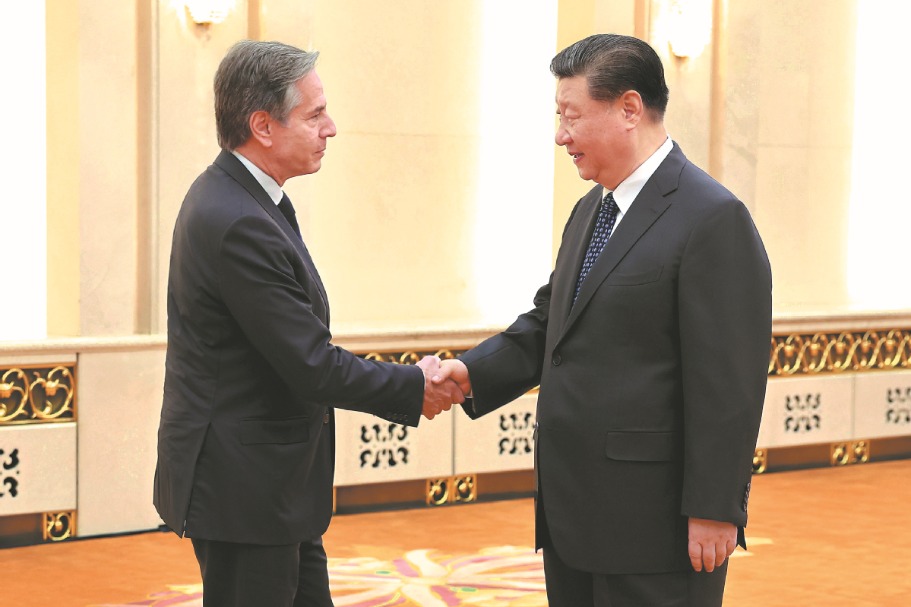'Cooperative investment' form of bribery targeted
By YANG ZEKUN | China Daily | Updated: 2024-03-21 09:29

Top anti-graft watchdogs calling for rigorous investigation into corruption
The country's top anti-graft watchdogs have called for a rigorous investigation into corruption disguised as "cooperative investment" following reports of such cases in multiple cities.
An article from the Central Commission for Discipline Inspection of the Communist Party of China and the National Commission of Supervision warned that this emerging form of corruption is often concealed by a veil of legitimacy.
The article said that Shen Junyu, the former deputy manager of the Hangzhou Economic and Technological Development Zone Asset Management Group in Zhejiang province, arranged for family members to hold shares on his behalf and introduced third parties to purchase shares, thereby becoming a shareholder of a technology company in Hangzhou.
Upon discovering the company was running a deficit, he leveraged his position to facilitate others in repurchasing his shares, safeguarding his own funds.
Shen was sentenced to 10 years and six months in prison for bribery and fined 700,000 yuan ($97,200).
Zhang Jinghua, a discipline inspection official from Hangzhou's Fuyang district, stated that the essence of bribery lies in the exchange of power for money.
Cooperative investment involves officials leveraging their authority to obtain shares and profit from their positions, assisting economic activities through related approvals, the allocation of funds and policy influence.
In practice, officials engaging in cooperative investment is a complex issue, and investigators must analyze the specific circumstances to determine whether the behavior constitutes a violation.
According to China's top court and procuratorate, officials who use their positions to seek benefits for others and reap financial rewards for the "cooperative "establishment of companies will be held accountable for bribery.
The article noted that the emergence of cooperative investment reflects a loosening of ideological vigilance among some Party members and officials, making them susceptible to being "hunted" by malicious actors, and diverting their attention and energy toward exploiting loopholes and seeking personal gain.
The inadequate supervisory and restraint mechanisms, coupled with the inherent risk of officials using power to seek profits, serve as another catalyst for cooperative investment, the article said. It is imperative to tighten institutional constraints and address deficiencies in supervision, striving to transition from addressing individual cases to systemic reforms and comprehensive governance, it added.
The communique of the Third Plenary Session of the 20th CCDI of the Communist Party of China released in January stated that efforts will continue to focus on key issues, areas and targets, as well as new and hidden forms of corruption. Punishing officials who collude with businesspeople or other individuals was emphasized as a top priority. Furthermore, efforts are being made to increase investigations of people who offer and accept bribes.
Chen Lin, an official from the discipline inspection and supervisory commission of Yichang, Hubei province, said that when encountering suspected cooperative investments, investigators should verify whether officials have made actual or sufficient investments and whether they actually participated in business management and operations.
"We should also clarify the legitimacy of their profits, determining the amount and distribution of any dividends and make sure there is an assumption of investment losses," he said. "If one party only enjoys benefits without assuming risks, or the proportion of risk assumed is unreasonably small, it obviously violates market rules."
In the case of Zeng Xinnian, the former vice-chairman of the Chinese People's Political Consultative Conference of Yichang's Wujiagang district, he had long been the leading official in the local urban construction industry and helped establish a construction team with two other individuals through his relatives. The two provided funding for the team, which later became a company, and Zeng, using his power, sought projects for the company.
In return, Zeng was given 20 percent of the company's shares, through which he earned 20 percent of the company's profits each year. He transferred the shares to his relatives, but remained the actual controller.
In September 2022, Zeng was expelled from the Party, and his retirement benefits were canceled due to his behavior. He was sentenced to 13 years in prison and fined 1 million yuan.
Chen, the Yichang official, said that in addition to arrests and prosecutions, any illegal gains should be confiscated to eliminate the breeding ground for corruption.
























